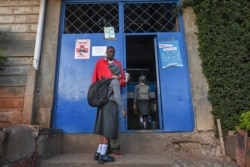John Kamande sells caskets out of a showroom in Kenya that, until last year, was full of young life.
The building was a privately-run Nairobi kindergarten until July, when the COVID-19 pandemic forced it to close.
"The corona pandemic is the one that made me to get this shop, because the school was closed, and there were no kids," Kamande said.
Kenya's Private School Association says nearly 400 private schools were forced to close because of the pandemic, affecting 56,000 students.
Now the buildings are being repurposed, as shops, storage facilities, businesses and residences.
Twenty-nine-year-old Nassir Kirui taught math and science before his school closed, but stayed on as the property manager after the building was converted into rental housing.
"I used to be a teacher here," he said. "But because of money, I lack money, that's why I asked to be the caretaker."
While Kenya's schools opened this month for the first time since March, the impact of private school closures is likely to be felt for some time.
"We have a very big supply gap in our country, and our population is growing — last census at about one million a year. So, we have a lot of work to do," said Mutheo Kasanga, national chair of the Kenya Private Schools Association.
Kenya's government in September pledged about $64 million in support for private schools but is yet to make good on the promise.






